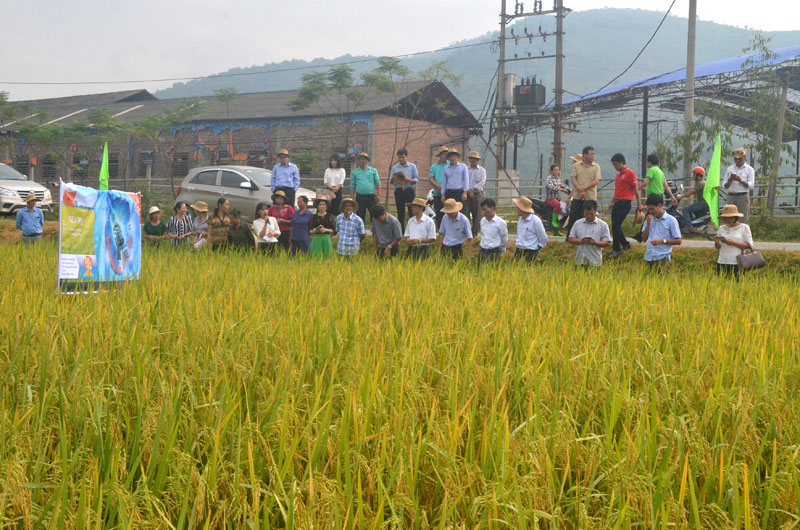
(HBO) – The Department of Agriculture and Rural Development of Hoa Binh province has recently partnered with the national centre for plant varieties and Thai Binh Seed Corporation to hold a conference on directing use of varieties and management of new pests in rice and citrus fruits in the province.

Delegates of the conference visited
the field demonstrations of some new rice varieties in Khang Dinh village, Yen
Mong commune, Hoa Binh city.
The conference reviewed the current use of rice and citrus
seeds in the province. The province has seen the increasing use of high-quality
conventional and hybrid rice but the percentage of use widely varies between
districts.
High-quality conventional rice has been cultivated across
81-90 percent of rice fields in Cao
Phong, Ky Son and Yen
Thuy districts and Hoa Binh city while hybrid rice accounted for a majority of
the rice areas in Lac Thuy district. The hybrid rice is regarded as suitable to
the province’s diversity in terrain, climate and soil.
There is also a growing trend of cultivating high-yield,
high-quality, and short-growth-duration varieties, making it easier for local
farmers in intensive farming, increasing productivity and land use.
Hoa Binh has developed a wide range of citrus varieties in
order to suit the local farmers’ needs to grow the fruits throughout the year
and reduce price drops due to abundant supplies. Most of the citrus varieties
had been piloted in small farms before grown in large areas, so they developed
well in local soil condition and weather.
In Lac Thuy district, communes have been succeeded in promoting their One Commune-One Product (OCOP) products while others are still struggling to position their typical farming products in market. Some communes in the district still fail to have their products met OCOP programme’s requirements, while others have seen their certifications expired.
The inspectorate agency of Hoa Binh province has issued Official Dispatch No. 1090/TTr-PCTN to provincial departments, agencies, localities, business associations, enterprises, and investors regarding measures to improve informal component indexes of the Provincial Competitiveness Index (PCI).
Hoa Binh is taking concrete steps to improve its investment environment, with a strong focus on supporting businesses, settling obstacles for strategic investors, and creating opportunities for robust development in the coming years.
Under the blazing early summer sun, the construction site of Nhuan Trach Industrial Park (IP) in Luong Son district is abuzz with activities from dawn to dusk, a testament to the determination of the investor to meet their construction targets on schedule.



